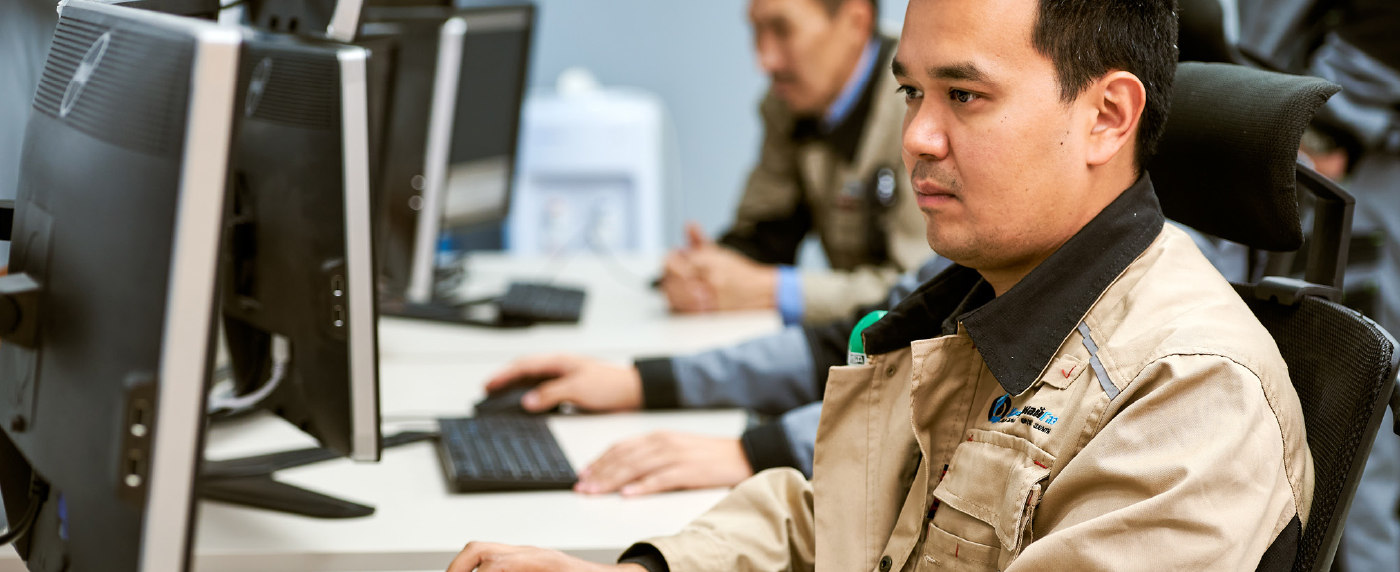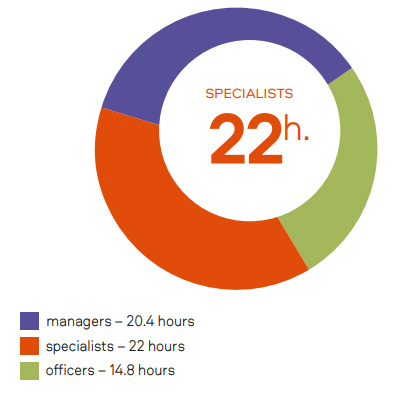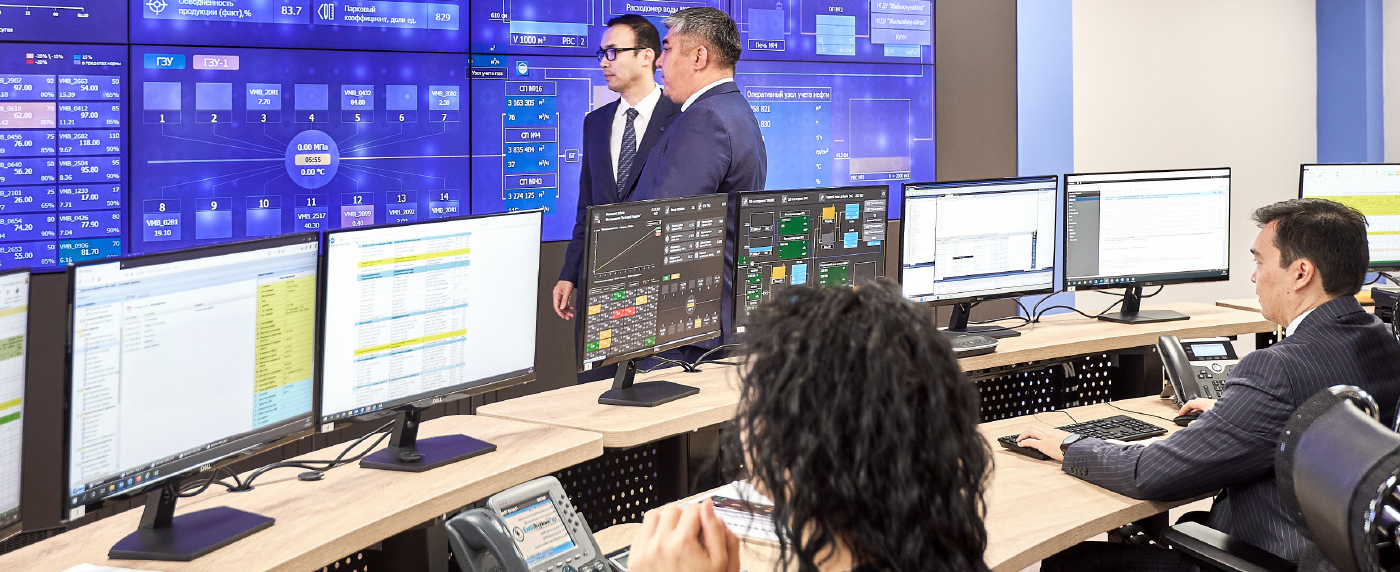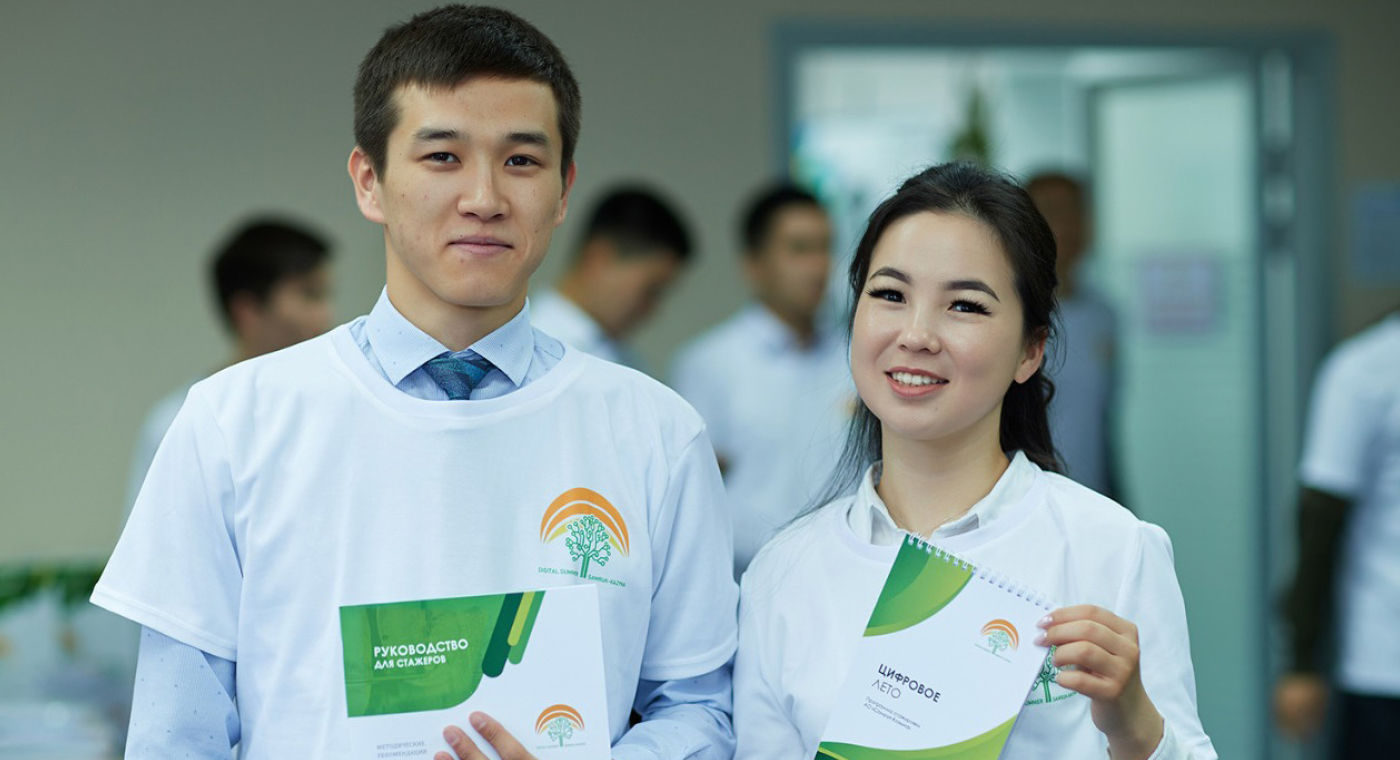Personnel Developmen
KMG Group has implemented a unified personnel training and development process in accordance with the approved Human Resources Policy. The need to train managerial, administrative and engineering personnel is based on Individual Development Plans following the results of regular comprehensive personnel performance assessments and needs stated by employees’ direct supervisors based on the objectives of the business unit.
Production personnel training is based on assessment of professional knowledge, skills and business needs. Therefore, planning of employee training is strictly regulated, and depends on the specific business goals and objectives.
KMG provides personnel training and development, implements new approaches and programmes for development of employees of KMG Group on an annual basis.
Starting in 2021, compulsory training in occupational occupational health and safety, industrial safety and fire-technical minimum pass on the platform of KMG Engineering LLP.
An Onboarding Course has been developed to cover information on the company’s history and values, as well as sustainability issues. The Onboarding Course is intended for newly hired workers.

Pursuant to item 2 of Resolution No. 23 of the Government of the Republic of Kazakhstan dated 27 January 2017 on Approval of 2017-2019 Action Plan to Implement the State Programme for Development and Functioning of Languages in the Republic of Kazakhstan for 2011-2020, the 2017-2019 Action Plan of JSC NC “KazMunayGas” to Implement the State Programme for Development and Functioning of Languages in the Republic of Kazakhstan for 2011-2020 was approved.
As part of this Action Plan, there were continuous Kazakh language courses were organized for KMG employees, taking into account the results of testing.
KMG has four management systems in accordance with international ISO standards: Quality Management System (ISO 9001); Environmental Management System (ISO 14001); Occupational Health and Safety Management System (ISO 45001) and Information Security Management System (ISO 27001).
These management systems have been certified and KMG declares to its stakeholders that the quality of services, environmental protection, occupational health and safety, and information security are under manageable conditions and control of the company.
Each of KMG’s business units has designated employees in charge of management systems, and IMS and ISMS. 46 employees took part.
In order to implement the Compliance Risk Minimisation Action Plan and for systematic quality control of compliance by the Company and its employees with the legal and ethical standards in the field of compliance, the Compliance Monitoring System Arrangement and Compliance Risk Management training was provided for all employees of the Corporate Centre.
The training programme includes a brief introduction to compliance monitoring and anti-corruption law (RoK law, UKBA, FCPA, Sapin II); conflict of interest (declaration, settlement); dealing with government authorities and politically exposed persons; reputation risks; compliance risks and controls in business processes (procurement, HR, M&A, marketing, etc.); Company’s Hotline and more.
Effective thinking method training was launched for top and middle managers of SDEs and CC.
The module discusses analytical tools, conceptual maps and, most importantly, practical tools of strategic management
Sub-topics of the programme:
- Critical thinking in management activities;
- Strategic management;
- Operational management;
- Intelligence maps.
Innovative technology integration is one of KMG’s priorities.
A unified approach to integrating digital transformation into the production cycle at KMG’s production facilities has been prepared and is being actively implemented.
In order to immerse the top management in the subject of digital transformation, KMG and SKOLKOVO Moscow School of Management have jointly launched a Digital Transformation Management Training Programme involving speakers from among digitalisation managers at major Russian production companies such as Sibur, Severstal and Gazprom.
The training allowed to achieve the following programme objectives:
- Immerse in the subject of digital transformation (understanding the need and value);
- Analyse the key challenges, opportunities and threats facing the industry in relation to digitalisation;
- Explore the practices of advanced benchmark companies and current digital transformation tools.
Establishment of a Multifunctional Shared Service Centre for JSC NC “KazMunayGas” Group
Participation in international training conference about Shared Service Centres has been arranged under the project roadmap for Creation of Multifunctional Shared Service Centre of JSC NC “KazMunayGas”.
The training allowed to achieved the following programme objectives:
- How Process Mining can improve your automation programme.
- Develop a holistic human capital development programme for the future workforce.
- Digital transformation of the Russian Railways Social and Personnel Centre. Case studies.
- Fast-track creation of a SSC.
- Change management in creation and development of SSC
- Setting up a new financial centre in fully virtual mode. Trivium Packaging BSC case.
- Talent market. AI for HR, a successful personnel transformation programme, continuous feedback and performance management.
- SSC transformation: Why we don’t like the term ‘customer-oriented’.
- Panel discussion on: “Launching SSC on the outsourcing provider market: opportunities and risks, pros and cons”
- “Maintenance support – expert and technical functions in SSC”.
- A single IT platform for SSC services
- SSC HR as a precursor to HR Zero.
- Introducing gamification to develop non-financial employee motivation and team building in remote working environments
- Panel discussion on: “Tips for beginners: what steps to take before creating a SSC”.
ANNUAL AVERAGE NUMBER OF HOURS PER EMPLOYEE BY CATEGORY

The average annual number of academic hours per employee is 16.7 hours16 (14.7 hours in 2020, 17.6 hours in 2019), including 16.4 hours per man (14.6 hours in 2020, 18.0 hours in 2019) and 18.6 hours per woman (16.0 hours in 2020, 15.1 hours in 2019).
At the same time, it should be noted that employees are trained and developed irrespective of their gender and position.
Information on the project for Succession Plan for Key Positions – MANSAP
In 2020, a Succession Plan creation procedure was developed by KMG’s HR Department and reviewed by the Nomination and Remuneration Committee of KMG’s Board of Directors as instructed by KMG’s Board of Directors.
According to this Procedure, a project was launched to develop a Succession Plan for the key positions of KMG Group – MANSAP.
The project provides for formation of a succession pool for three position levels based on the results of appraisal procedures:
Pool A – Succession Plan for Members of KMG’s Management Board and SDE CEOs;
Pool B – Succession Plan for Managerial Employees of KMG/SDEs;
Pool C – Succession Plan for KMG/SDE unit heads.
At the end of 2021, as part of this project:
The Nomination and Remuneration Committee of KMG’s Board of Directors (Minutes No. 1/2021 dated 9 February 2021) resolved to approve a succession pool for Pool A positions;
The Leadership Educational Programme has been approved and launched together with the Moscow School of Management SKOLKOVO for the Pool A successors.
KMG’s Management Board (Minutes No. 31 dated 16 September 2021) resolved to approve a succession pool for Pool B positions;
Selection procedures have been implemented to develop the Succession Plan for Pool C positions
The talent pool forming is aimed at improving the management efficiency through transparent selection and improvement of managers’ competencies.
Project Management Training in KMG Group
As part of the implementation of project management, since 2020 the systematic efforts has been made to improve the competence of project personnel.
Training in basics, project management subject areas, project review, and employee certification to international PMI and IPMA requirements is provided centrally by the company’s corporate centre, with most training delivered by the company’s own coaches.
In total, more than 1,500 employees of KMG and its SDEs have been trained over the past two years, including more than 400 employees in 2021. Also in 2021, a course on the role of top management in the successful project implementation was held for more than 70 executives of KMG and its SDEs.
The Company believes that sustainability of the corporate project management system and performance in projects can be achieved primarily through training.
In 2021, the corporate project management training was arranged for KMG’s top and middle managers as part of Zhanaru Project. The aim of this training is to create a pool of KMG project specialists and to optimise the cost and efficiency of training by selecting and sending the employees only based on actual need (operational need). 17 employees of CC and 10 employees of SDEs were trained during the implementation period.

Work with Students and Young Specialists
KMG hosted 27 students from various universities in Kazakhstan for on-the-job training and pre-graduation internships, which were announced in Q1 2020. Student internships were suspended after the restrictions related to COVID-19 were imposed.
- Qualification requirements for graduates are
expanding on an ongoing basis due to increasing
globalisation and continuous changes in industry.
KMG Group is actively engaged with educational
institutions to develop and promote a
practice-oriented approach to training the next
generation of specialists and unlocking the
professional qualities of students
A dual learning programme is implemented to train skilled workers in close cooperation between companies and educational institutions: the apprentices learn their trade on the job. Between 2018 and 2021, 244 students from educational institutions took part in the programme, 98 of whom were employed by KMG’s production enterprises (Embamunaygas JSC, Pavlodar Oil Chemistry Refinery LLP, Atyrau Refinery LLP)..
- Considering the Petrochemical Industry Development Programme of the Republic of Kazakhstan currently being implemented and two large-scale oil and gas chemical plants to be launched, there is an active work in Atyrau Region to create a modern petrochemical educational cluster at the Safi Utebayev Atyrau University of Oil and Gas (hereinafter, the University). Under the leadership of Atyrau Refinery LLP, the material and technical facilities of the former Department of Chemistry and Chemical Engineering at the University were completely upgraded, including a complete renovation of lecture halls and chemical laboratories, their furnishing and equipment, and fitting out and furnishing of support facilities. The Institute of Petrochemical Engineering and Ecology has opened at the University. The University has 12 new laboratories with state-of-the-art equipment for students to acquire practical skills of applying instrumental physical and chemical methods of analysis to test oil, gas and refined products.
- Zhas Orken and Digital Summer Projects

In 2017, Samruk-Kazyna Fund initiated the Zhas Orken Programme to develop a new generation of managers with a broad professional outlook, and the Digital Summer Programme to engage young specialists in the Fund’s Digitalization Projects. The main advantage of the programmes is accelerated development under the guidance of mentors from among experienced company employees. During the Zhas Orken Programme, young specialists rotate through 4 different companies of the Fund across Kazakhstan.
During the programme implementation, 61 young specialists were rotated under the Zhas Orken Programme in KMG Group, 15 of whom were employed; 18 young specialists, including current students, passed the Digital Summer Programme; 3 programme graduates were employed.
Environmental Management Training
HSE training in KMG Group is still in demand. For this reason, compulsory education, training and advanced training in occupational health and safety, industrial and fire safety and environmental protection are a priority.
From 2021, compulsory training in health and safety, industrial safety and fire safety basics for KMG CC employees take place on the KMG Engineering LLP’s platform.

Health, safety and environment training is based on a 70/20/10 on-the-job/internal/external training model at existing in-house training facilities/centres. Mentoring and internal coaching programmes with the involvement of experienced employees are implemented, master classes and trainings are conducted, various contests among leading employees are held, which enables to improve internal communications and encourage people to be the best in their professions.
Ozenmunaygas JSC (Zhanaozen), JSC “KazTransOil” (Aktau), Pavlodar Oil Chemistry Refinery LLP (Pavlodar) and Oil Services Company LLP (Aktau) have their own training facilities/centres.
Environmental training sessions, workshops for employees are held on a periodic basis. In addition, in September 2021, a separate training session for members of KMG’s Board of Directors and Management Board on the requirements of the new RoK Environmental Code was held at HSE Forum of KMG SDE CEOs with involvement of the environmental authority and the developers of the Code.